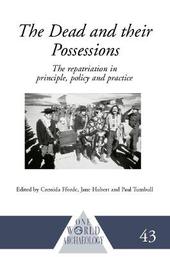
|
The Dead and Their Possessions: Repatriation in Principle, Policy and Practice
Hardback
Main Details
| Title |
The Dead and Their Possessions: Repatriation in Principle, Policy and Practice
|
| Authors and Contributors |
Edited by Cressida Fforde
|
|
Edited by Jane Hubert
|
|
Edited by Paul Turnbull
|
|
Edited by Deanne Hanchant
|
| Series | One World Archaeology |
|---|
| Series part Volume No. |
v.43
|
| Physical Properties |
| Format:Hardback | | Pages:360 | | Dimensions(mm): Height 234,Width 156 |
|
| ISBN/Barcode |
9780415233859
|
| Classifications | Dewey:930.1 |
|---|
| Audience | | Undergraduate | | Postgraduate, Research & Scholarly | | Professional & Vocational | |
|---|
| Illustrations |
20 drawings and 20 b&w photographs
|
|
Publishing Details |
| Publisher |
Taylor & Francis Ltd
|
| Imprint |
Routledge
|
| Publication Date |
17 January 2002 |
| Publication Country |
United Kingdom
|
Description
During the nineteenth and early twentieth centuries, large numbers of indigenous human remains were collected for the purpose of studying racial differences, according to contemporary notions of racial hierarchy. Such studies contributed to how 'other' peoples were perceived in the colonial era, and subsequently. More recently, human remains in university and museum collections also include those uncovered through archaeological excavation and retained for the scientific study of past populations. Increasingly, indigenous peoples worldwide are asserting their fundamental right to determine the future of the human remains of their ancestors, and are requesting their return, often for reburial - with varying degrees of success. This campaign, and the opposition from those who curate and study these items, is known as the 'reburial' or 'repatriation' issue, and has become part of a wider Human Rights debate. The reburial issue has brought under scrutiny the ethics of scientific practice, raising cultural and moral issues that have not easily been resolved between groups of people with varying histories and beliefs. The Dead and Their Possessions presents recent research by indigenous and non-indigenous people from museum, archaeological, anthropological, historical, educational and community backgrounds. The authors examine a wide range of histories, experiences, developments and consequences of the collecting and/or repatriation of human remains, with contributions from countries such as Uruguay and South Africa, where the issue is only just beginning, to the United States, where repatriation has been law for over a decade. This book raises fundamental questions about the nature, ethics and practice of scientific enquiry, the 'ownership' of the dead, the politics of the past and the needs of the future. The issues surrounding the collecting and repatriation of human remains are not only of vital importance to many indigenous groups, but also to the future of museum curatorship and the nature and practice of archaeology and anthropology today. This book will be invaluable not only to those involved in the teaching and research in this field, but also to museum professionals who have received repatriation requests, and to those groups who are facing the challenges of the return of human remains and cultural objects to their own communities.
Author Biography
Cressida Fforde is an independent researcher and holds an honorary post at the Institute of Archaeology, University of London. Jane Hubert is Senior Research Fellow and Honorary Senior Lecturer in the Dept of Psychiatry of Disability at St George's Hospital Medical School. Paul Turnball is Senior Research Fellow, Centre for Cross-Cultural Research, Australian National University
Reviews"Jane Hubert and Cressida Fforde introduce 27 engrossing papers on the problems of ethics and ownership arising over how First World biological anthropologists and museums treat human remains from 'developing' countries and Fourth World peoples." - Antiquity
|